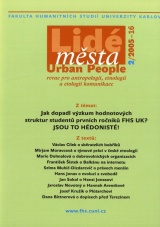Gnóstické motivy v díle Plútarcha z Chairóneie
DOI:
https://doi.org/10.14712/12128112.3903Abstrakt
This article includes comparison of selected parts of Plutarch treatises De facie in orbe lunae and De genio Socratis with references primarily to Valentinian gnosis, that has been preserved in Clement of Alexandria and Irenaeus, reflecting agreements and differences regarding their specific anthropology and also the so called concept of Himmelsreise der Seele. In these treatises, Plutarch sharply differentiates between the soul (PSYCHÉ) and the mind (NÚS), while in De genio he differentiates three potential inter-relationships between them (mind is in harmony with soul and body, mind is not in harmony with soul and body, soul and body has no relationship to mind). This roughly corresponds to the doctrine of exclusivity of pneumatic principal that is the basis of the well-known gnostic triad – hylics, psychics, and pneumatics. However, the basic difference is that Plutarch’s total metaphysical human condition is primarily a function of upbringing and education. In the second case, it is exclusively a function of excellence of own FYSIS. Regarding the Himmelsreise der Seele, there is a fundamental difference between the platonic and gnostic-Christian concepts: The basic equivalence between cosmic structure and soul’s afterlife is the same. At the same time, there is a clear conflict between Plutarch’s reversible eschatology on one hand, resulting in an overall optimistic perception of the world, and the anti-cosmic attitude of gnostics on the other hand: Intention of gnostic redemption, contrary to Platonic attitude, where the soul destiny is to circulate between individual ontological levels of cosmos, to spiritualize it and keep it together as an entity. Gnostics are always oriented outwards, towards its total transcendence.
Stahování
Publikováno
Jak citovat
Číslo
Sekce
Licence

Tato práce je licencována pod Mezinárodní licencí Creative Commons Attribution-NonCommercial-NoDerivatives 4.0.


